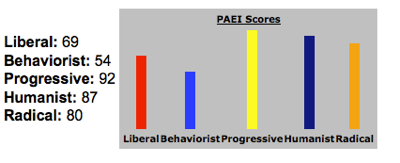Teaching Philosophy
My philosophy of teaching has evolved over two decades to become more learner-centered. My teaching style is more of an organizer or coach in which I guide learning through authentic experiences that are educative in order to stimulate, activate, and evaluate learning processes.
I strive to ensure that students learn the content of the courses I teach, my objectives as a university teacher are as follows: (a) to foster critical thinking skills; (b) to encourage the acquisition of lifelong learning skills; (c) create a positive learning environment where different learning styles flourish; and (d) craft meaningful learning opportunities for authentic practice. Furthermore, my overall teaching philosophy is based on two principles, which are supported extensively in the adult learning literature: (a) active and relevant student learning strongly influences student-learning outcomes; and (b) the realization of one’s full potential and the ability to use the skills for the greater good (Dewey, 1938).
To accomplish this, I employ a wide variety of strategies based on grounded educational principles incorporating assessment, cognitive ability, learning theories, experiential learning, and instructional planning.
Cognitive abilities of the learner: Considering the cognitive ability of learners is essential in order to implement and apply learning strategies that are appropriate for the learners. I routinely plan activities, such as online discussion forums, synchronous and asynchronous collaborative activities, reflection papers, and direct application of content that can help me determine the cognitive levels of my students and customize my instruction accordingly.
Learning theory: I embed critical thinking strategies into my practice as an educator. Diane Halpern’s (2003) model for teaching critical thinking skills focus on the dispositions students require becoming critical thinkers. Cognitive and constructivists theories offer a wealth of principles that, when used appropriately, can benefit classroom learning and management at all levels. Some of my learning activities that are well received by students include: online direct application of skills in authentic contexts, debates, and interactive lectures.
Employing these basic strategies helped me develop my abilities for teaching. More importantly, I have discovered that, by sharing my ‘passion’ for teaching and learning, and using these strategies with enthusiasm and empathy helps to connect with my students. As a result, teaching with passion and providing authentic opportunities for application effectively impacts learners, and their desire for lifelong learning.

Zinn (1990) stated that most educators have a clear primary philosophical orientation. A few years ago I completed the Philosophy of Adult Education Instrument (PAEI). The results (see above) of the PAEI indicate that my primary philosophical orientation is ‘progressive’.

Pre-Assessment:
At the beginning of each of my courses I administer a learning styles instrument (Kolb, 1999) and modified version of the Myers Briggs Type Instrument (MBTI) to determine the types of learning approaches my students prefer. Additionally, I require each student to create a ‘Digital Introduction’ PowerPoint presentation that identifies their previous knowledge or experience, long and short-term goals, personal learning goals for the class, and attitudes about the topic.

Instructional Planning:
I plan and implement lessons that clearly identify the lesson objectives, strategies for effective student engagement, and assessment options to measure student mastery. Whether the instructional approach is based on a behavioral model (direct instruction, mastery learning) such as lesson 4’s Objective Writing Bootcamp, a cognitive model (exposition/presentation) such as a collaborative online debate, or a constructivist model (inquiry-based/Socratic methods, cooperative learning) such as direct authentic practice, this helps me teach with both clarity and focus.
References:
Dewey, J., (1938). Experience and Education. New York, NY: Kappa Delta Pi.
Halpern, D. F., & Hakel, M. D. (2003). Applying the science of learning to the university and beyond: teaching for long-term retention and transfer. Change, July/August, p. 2-13.
Kolb, A., & Kolb, D. A. (1999). Bibliography of research on experiential learning theory and the Learning Style Inventory. Department of Organizational Behavior, Weatherhead School of Management, Case Western Reserve University, Cleveland, OH
Zinn, L. M. (1990). Identifying your philosophical orientation. In M.W. Galbraith (Ed.), Adult learning methods. (pp. 39-56). Malabar, FL: Krieger Publishing Company.

